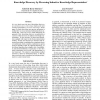Free Online Productivity Tools
i2Speak
i2Symbol
i2OCR
iTex2Img
iWeb2Print
iWeb2Shot
i2Type
iPdf2Split
iPdf2Merge
i2Bopomofo
i2Arabic
i2Style
i2Image
i2PDF
iLatex2Rtf
Sci2ools
KR
2004
Springer
2004
Springer
Knowledge Discovery by Reversing Inductive Knowledge Representation
In a very basic sense, the aim of knowledge discovery is to reveal structures of knowledge which can be seen as being represented by structural relationships. In this paper, we make this notion more precise and present a method how to extract structural information from statistical data. There are two key ideas underlying our approach: First, knowledge discovery is understood as a process which is inverse to inductive knowledge representation. So the relevance of discovered information is judged with respect to the chosen representation method. Second, the link between structural and numerical knowledge is established by an algebraic theory of conditionals, which considers conditionals as agents acting on possible worlds. By applying this theory, we develop an algorithm that computes sets of probabilistic rules from distributions. In particular, we show how sparse information can be dealt with appropriately in our framework. The inductive representation method used here is based on in...
Artificial Intelligence | Inductive Knowledge Representation | Knowledge Discovery | KR 2004 | Representation Method |
Related Content
| Added | 02 Jul 2010 |
| Updated | 02 Jul 2010 |
| Type | Conference |
| Year | 2004 |
| Where | KR |
| Authors | Gabriele Kern-Isberner, Jens Fisseler |
Comments (0)

